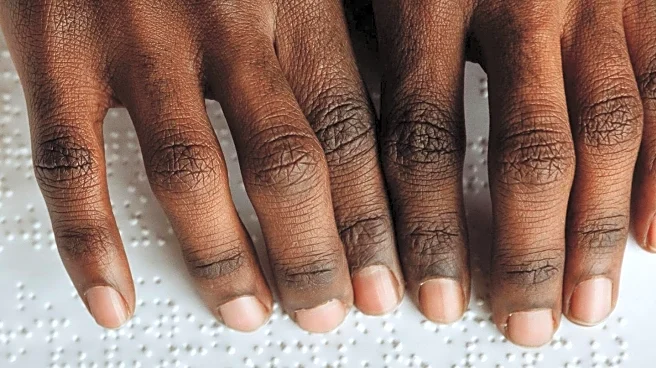What's Happening?
A multidisciplinary study led by Professor Emmanuel Oluwadare Balogun from Ahmadu Bello University, in collaboration with Japanese researchers, has validated the Smart Eye Camera (SEC) as a teleophthalmology device aimed at reducing preventable blindness
in Nigeria. The SEC, developed by OUI Inc., Japan, is a smartphone-mounted device that offers a cost-effective alternative to traditional slit-lamp microscopes, enabling detailed eye examinations. The study demonstrated that the SEC provides high-resolution images with up to 96% diagnostic accuracy, comparable to conventional equipment. The device is particularly beneficial for rural and remote areas, offering real-time telemedicine capabilities and cloud storage for data sharing.
Why It's Important?
The validation of the Smart Eye Camera is significant as it addresses the high prevalence of blindness in Nigeria, particularly in the North-West region, where an estimated 1.13 million people are affected. The SEC's affordability and portability make it a game-changer in eye healthcare, potentially bridging the gap in accessibility for underserved communities. With the device costing significantly less than traditional equipment, it offers a viable solution for improving eye care in low- and middle-income countries. The study highlights the global impact of the SEC, as it could revolutionize eye care for over 1.2 billion people worldwide experiencing vision impairment or blindness.
What's Next?
The successful validation of the SEC paves the way for its broader implementation in Nigeria and potentially other countries facing similar challenges in eye healthcare. The device's real-time telemedicine capabilities could lead to prompt diagnosis and treatment, improving outcomes for patients in remote areas. As the SEC gains recognition, it may attract interest from healthcare providers and policymakers looking to enhance eye care services. Further studies and collaborations could explore additional applications of the SEC, expanding its use in teleophthalmology and other medical fields.
Beyond the Headlines
The introduction of the Smart Eye Camera raises ethical considerations regarding the accessibility and distribution of healthcare technology. Ensuring equitable access to the SEC, particularly in underserved regions, is crucial to maximizing its impact. The device also highlights the potential for technology to transform healthcare delivery, prompting discussions on the integration of telemedicine in traditional healthcare systems. As the SEC becomes more widely adopted, it may influence policy decisions and funding allocations for eye care initiatives.














